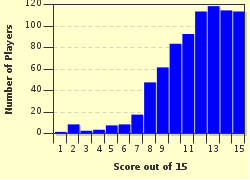Quiz Answer Key and Fun Facts
1. Congestive heart failure (or CHF) is the name for what kind of failure?
2. What is NOT characteristically one of the main symptoms of congestive heart failure?
3. Which of the following treatments is NOT a central recommendation for patients with congestive heart failure?
4. What is NOT a primary cause of congestive heart failure?
5. One of the biggest problems people with congestive heart disease have is excess consumption of sodium (salt) because salt can exacerbate fluid retention. Which food item has the highest sodium content?
6. Congestive heart failure is a condition which is chronic and which requires constant attention to diet, a reduction of stress, and daily medicines. Which of the following would most increase the burden on an already-weakened heart?
7. Medicine is an important component of treatment for congestive heart failure (CHF). Which one of these is NOT prescribed routinely for CHF?
8. What do cardiologists call an evaluation of the amount of blood pumped by the heart with each beat?
9. What is the technical term which describes the coronary arteries as being narrowed by hardened plaque, which limits the free flow of oxygen and overworks the heart?
10. Sometimes, people with congestive heart failure develop arrhythmias of the heart. These irregular rhythms can be conducive to developing a blood clot. Physicians frequently treat people with 'blood thinning' medicines which require regulation of the density of the blood. Which of these is the name for a blood-thinner?
11. There are two kinds of congestive heart failure, depending on which of the heart's two ventricles are affected. If the problem stems from the left ventricle, the prime pumping mechanism in the heart, which symptoms tend to dominate?
12. What is the name for shortness of breath only when lying down?
13. What is the condition in which the lungs retain extra fluid? This condition is a part of left ventricular impairment.
14. Now that you have seen in general terms what congestive heart failure is, what do you think is the most important thing to do to help prevent this chronic and life-threatening illness?
15. If the heart weakness limits a person's life too much, what major alternative will work more permanently than changing diets and attitudes?
Source: Author
Windswept
This quiz was reviewed by FunTrivia editor
crisw before going online.
Any errors found in FunTrivia content are routinely corrected through our feedback system.

